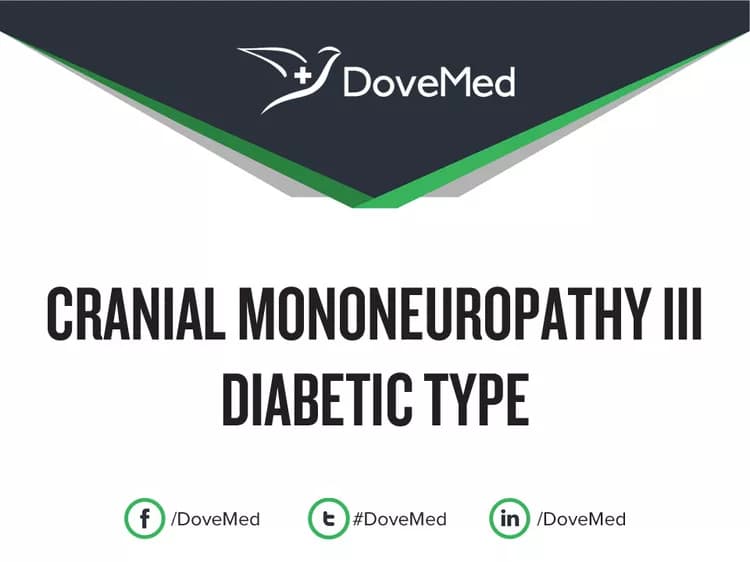What are the other Names for this Condition? (Also known as/Synonyms)
- Diabetic Third Nerve Palsy
- Pupil-Sparing Third Cranial Nerve Palsy
What is Cranial Mononeuropathy III - Diabetic Type? (Definition/Background Information)
- The nerves that originate directly from the brain and brainstem are called the cranial nerves. Cranial nerves are found in the ventral part of the brain. Generally, a human body has 12 pairs of cranial nerves that are connected to various body organs to perform several functions
- The third cranial nerve is called the oculomotor nerve, and it is responsible for the eyelids and their movements. When, as a result of diabetes, the oculomotor nerve is affected, the condition is termed Cranial Mononeuropathy III - Diabetic Type
- The condition generally leads to double vision and drooping of the eyelids. It is a common nerve disorder that occurs in diabetics. It can lead to permanent vision loss
- Diagnosis of Cranial Mononeuropathy III - Diabetic Type may include a thorough evaluation by the healthcare provider, complete eye examination, and blood tests to check sugar levels in blood. This condition usually occurs in combination with diabetic neuropathy (especially with pain and tingling in lower legs)
- Treatment of Cranial Mononeuropathy III - Diabetic Type include a proper control of blood sugar, and in some cases, surgery to correct the eyelid drooping
- Maintaining blood sugar levels at normally required levels can help reduce the risk for the condition. Individuals affected by Cranial Mononeuropathy III - Diabetic Type generally recover within 3-6 weeks upon proper treatment
Who gets Cranial Mononeuropathy III - Diabetic Type? (Age and Sex Distribution)
- Cranial Mononeuropathy III - Diabetic Type may affect individuals of any age group, who are affected by diabetes
- There is no gender predilection observed; both male and female sexes are equally affected
- This condition occurs worldwide; all racial and ethnic groups are affected
What are the Risk Factors for Cranial Mononeuropathy III - Diabetic Type? (Predisposing Factors)
Individuals, who are affected by diabetes and are regularly unable to keep their blood glucose levels at normal levels, have a high risk of developing Cranial Mononeuropathy III - Diabetic Type.
It is important to note that having a risk factor does not mean that one will get the condition. A risk factor increases ones chances of getting a condition compared to an individual without the risk factors. Some risk factors are more important than others.
Also, not having a risk factor does not mean that an individual will not get the condition. It is always important to discuss the effect of risk factors with your healthcare provider.
What are the Causes of Cranial Mononeuropathy III - Diabetic Type? (Etiology)
The oculomotor nerve (also known as the third cranial nerve) is affected due to diabetes. This results in Cranial Mononeuropathy III (Diabetic Type). Damage of this cranial nerve leads to double vision and drooping of the eyelids.
What are the Signs and Symptoms of Cranial Mononeuropathy III - Diabetic Type?
The signs and symptoms of Cranial Mononeuropathy - III Diabetic Type include:
- Double vision
- Drooping of one eyelid
- Headache
In addition to the above symptoms, individual may also have symptoms of diabetes that include the following:
- Increased thirst and hunger
- Frequent urination
- Extreme fatigue
- Unexplained weight loss
- Blurred vision
- Slow-healing sores on the skin
- Tingling and numbness in the feet and legs
How is Cranial Mononeuropathy III - Diabetic Type Diagnosed?
The diagnosis of Cranial Mononeuropathy III - Diabetic Type may involve:
- Physical examination and evaluation of medical history including a history of diabetes
- The physical exam shall include a thorough eye examination, which may reveal an improper alignment of the eyes and reaction of the pupil to light
Other tests may include:
- Blood tests to assess sugar levels
- HbA1C test: This test gives an average level of blood sugar over a period of 3 months
- Cerebral, CT, and MR angiograms: Angiograms are performed to observe the vessels of the brain and blood flow through them
- CT or MRI scan of the brain
- Lumbar puncture or spinal tap test
Many clinical conditions may have similar signs and symptoms. Your healthcare provider may perform additional tests to rule out other clinical conditions to arrive at a definitive diagnosis.
What are the possible Complications of Cranial Mononeuropathy III - Diabetic Type?
Cranial Mononeuropathy III - Diabetic Type may lead to complications such as:
- Permanent vision loss
- Permanent drooping of eyelid
How is Cranial Mononeuropathy III - Diabetic Type Treated?
The treatment for Cranial Mononeuropathy III - Diabetic Type includes:
- Monitoring blood sugar levels and taking measures to keep it under control
- Glasses with prisms can be used to reduce the effect of double vision
- Painkillers are recommended in order to obtain relief from pain
- Improper alignment of the eyes and drooping of the eyelids may be rectified through proper surgery
How can Cranial Mononeuropathy III - Diabetic Type be Prevented?
Maintaining blood sugar levels at normally required levels can help in lowering the risk of Cranial Mononeuropathy III - Diabetic Type in diabetics.
What is the Prognosis of Cranial Mononeuropathy III - Diabetic Type? (Outcomes/Resolutions)
- Upon proper treatment, individuals with Cranial Mononeuropathy III - Diabetic Type generally recover within 3-6 weeks
- In rare cases, some individuals may suffer from permanent weakness of the eye muscles due to severe damage to the third cranial nerve (the oculomotor nerve)
Additional and Relevant Useful Information for Cranial Mononeuropathy III - Diabetic Type:
The following DoveMed website link is a useful resource for additional information:
https://www.dovemed.com/health-topics/neurological-institute/
Related Articles
Test Your Knowledge
Asked by users
Related Centers
Related Specialties
Related Physicians
Related Procedures
Related Resources
Join DoveHubs
and connect with fellow professionals


0 Comments
Please log in to post a comment.